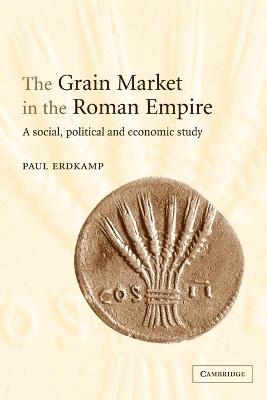
The Grain Market in the Roman Empire
A Social, Political and Economic Study
Seiten
2009
Cambridge University Press (Verlag)
978-0-521-11783-8 (ISBN)
Cambridge University Press (Verlag)
978-0-521-11783-8 (ISBN)
Grain was crucial to the food supply of the Roman Empire, and this study concentrates on its production, distribution and marketing. Taking a contemporary approach, it is essential reading for historians of ancient economies and all those interested in grain supply.
This book explores the economic, social and political forces that shaped the grain market in the Roman Empire. Examining studies on food supply and the grain market in pre-industrial Europe, it addresses questions of productivity, division of labour, market relations and market integration. The social and political aspects of the Roman grain market are also considered. Dr Erdkamp illustrates how entitlement to food in Roman society was dependent on relations with the emperor, his representatives and the landowning aristocracy, and local rulers controlling the towns and hinterlands. He assesses the response of the Roman authorities to weaknesses in the grain market and looks at the implications of the failure of local harvests. By examining the subject from a contemporary perspective, this book will appeal not only to historians of ancient economies, but to all concerned with the economy of grain markets, a subject which still resonates today.
This book explores the economic, social and political forces that shaped the grain market in the Roman Empire. Examining studies on food supply and the grain market in pre-industrial Europe, it addresses questions of productivity, division of labour, market relations and market integration. The social and political aspects of the Roman grain market are also considered. Dr Erdkamp illustrates how entitlement to food in Roman society was dependent on relations with the emperor, his representatives and the landowning aristocracy, and local rulers controlling the towns and hinterlands. He assesses the response of the Roman authorities to weaknesses in the grain market and looks at the implications of the failure of local harvests. By examining the subject from a contemporary perspective, this book will appeal not only to historians of ancient economies, but to all concerned with the economy of grain markets, a subject which still resonates today.
Paul Erdkamp is Research Fellow in Ancient History at Leiden University. He is the author of Hunger and the Sword. Warfare and Food Supply in Roman Republican Wars (264–30 BC) (1998). He is the editor of The Roman Army and the Economy (1998) and A Companion to the Roman Army (2010).
Introduction; 1. Production and productivity in Roman agriculture; 2. The world of the smallholder; 3. Farmers and their market relations; 4. Market integration: connecting supply and demand; 5. Rome and the corn provinces; 6. Urban food supply and grain market intervention; Conclusions; References; Indexes.
| Erscheint lt. Verlag | 30.7.2009 |
|---|---|
| Zusatzinfo | 5 Maps |
| Verlagsort | Cambridge |
| Sprache | englisch |
| Maße | 152 x 229 mm |
| Gewicht | 560 g |
| Themenwelt | Geschichte ► Teilgebiete der Geschichte ► Wirtschaftsgeschichte |
| Wirtschaft ► Volkswirtschaftslehre ► Mikroökonomie | |
| ISBN-10 | 0-521-11783-6 / 0521117836 |
| ISBN-13 | 978-0-521-11783-8 / 9780521117838 |
| Zustand | Neuware |
| Haben Sie eine Frage zum Produkt? |
Mehr entdecken
aus dem Bereich
aus dem Bereich
die Ukraine, Polen und der Irrweg in der russischen Geschichte
Buch | Hardcover (2023)
C.H.Beck (Verlag)
28,00 €


